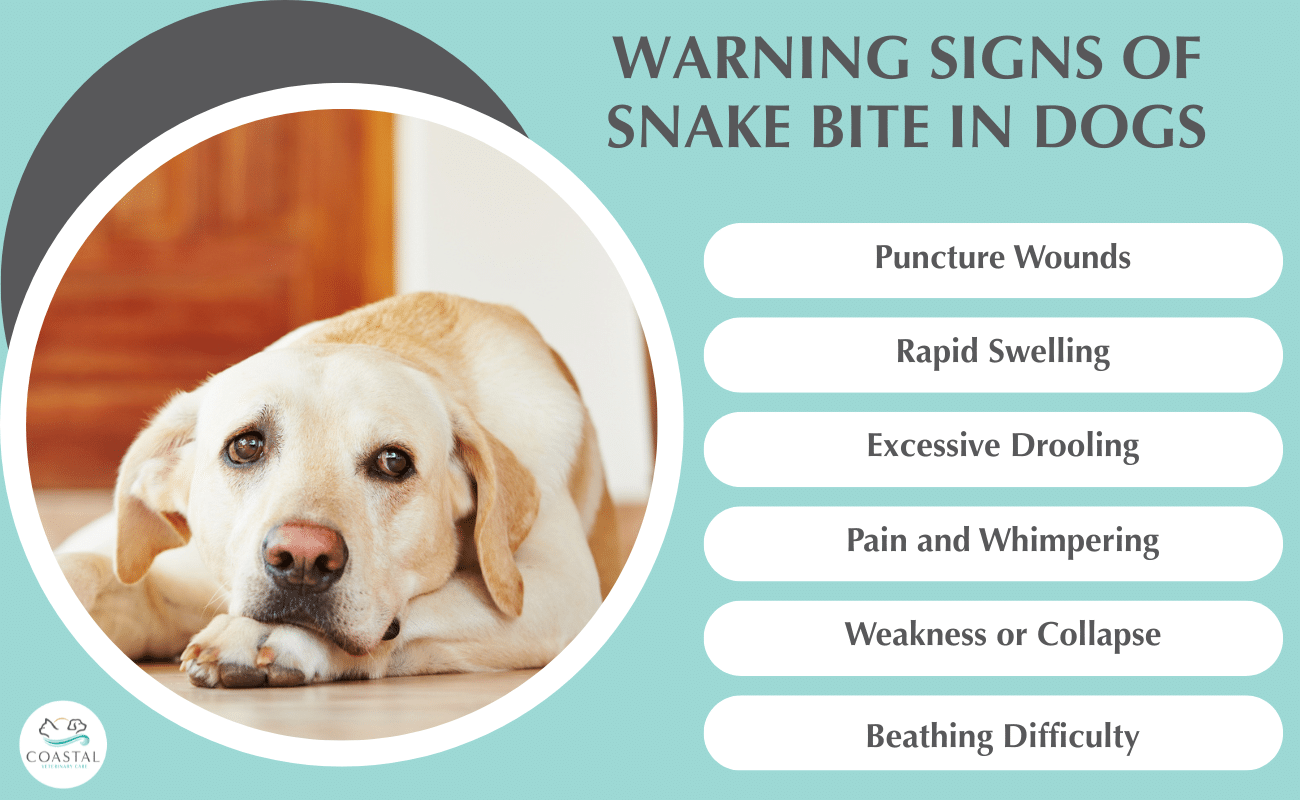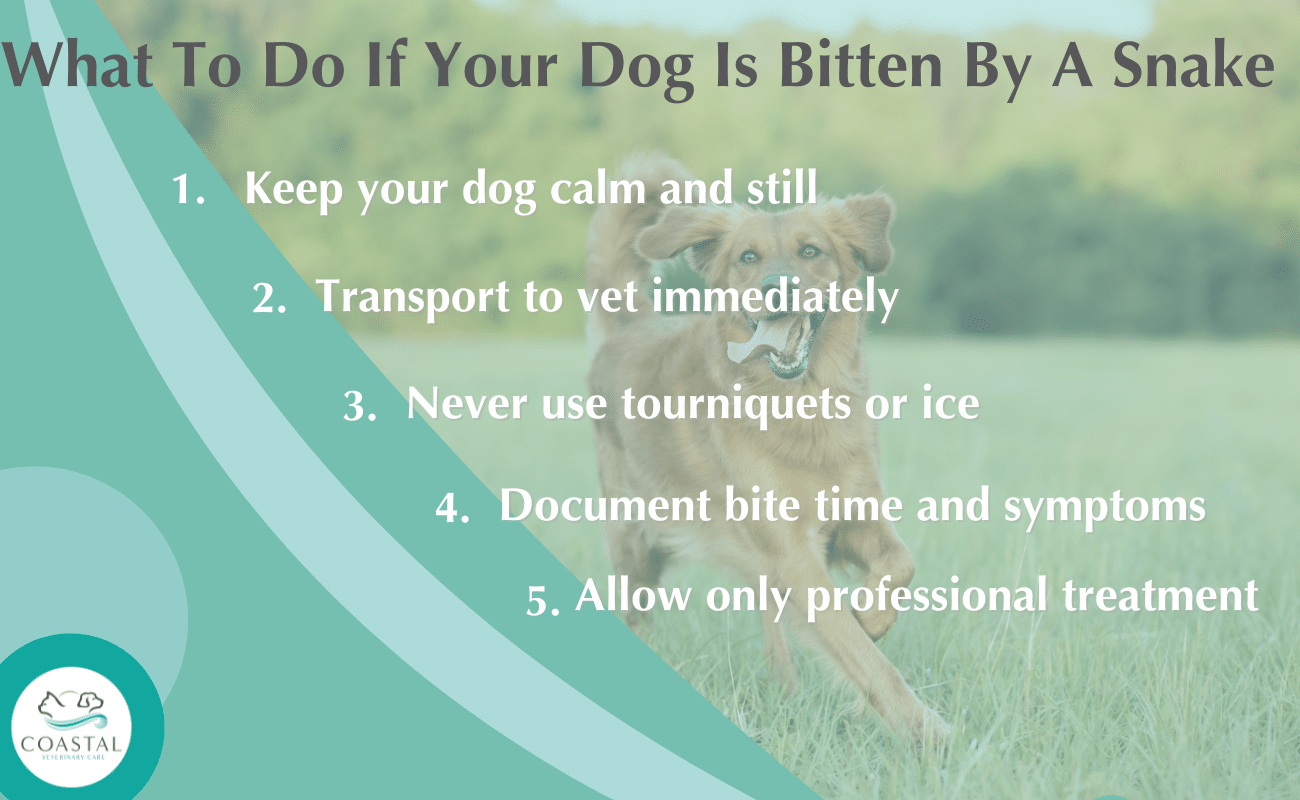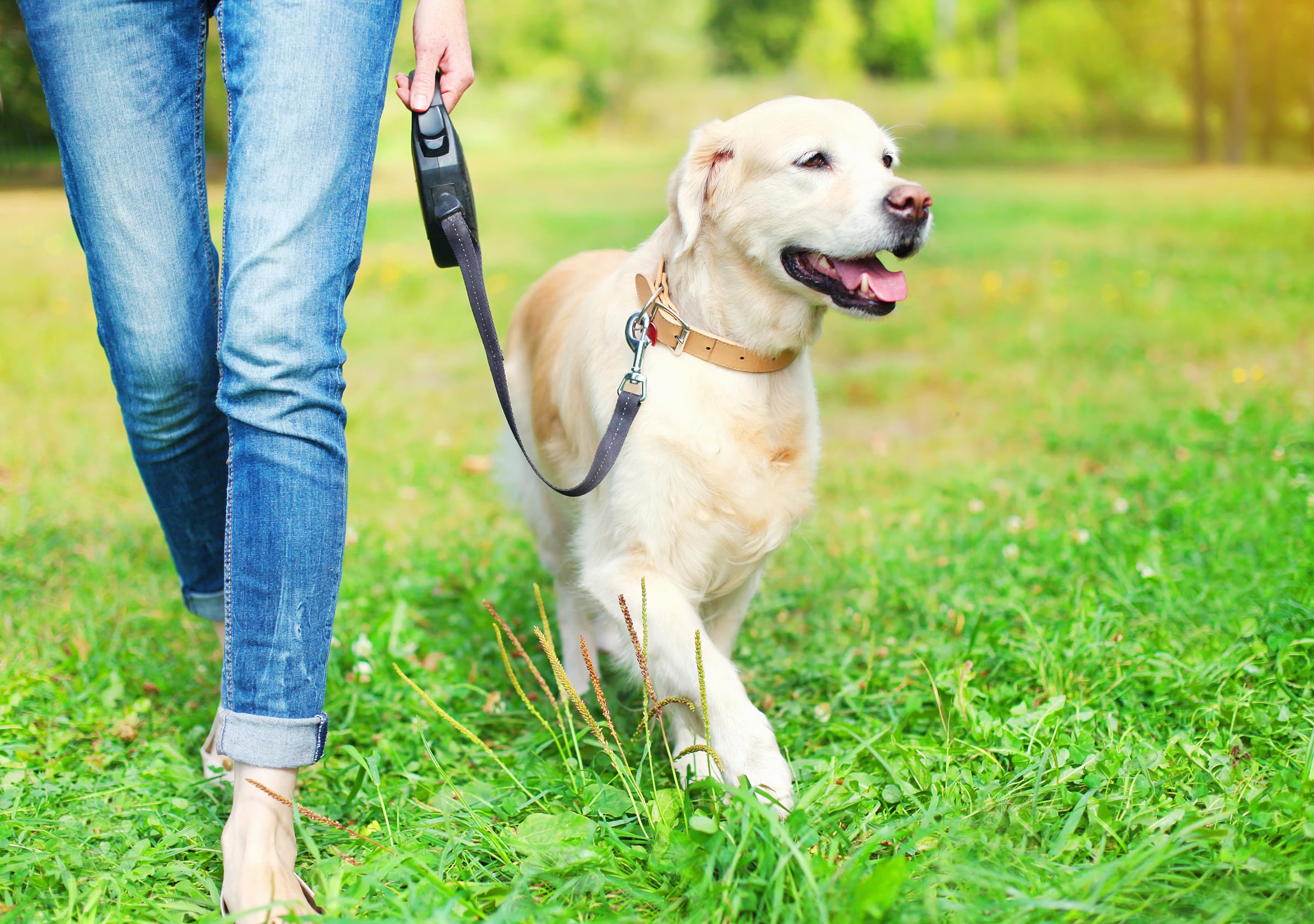What to Do If Your Dog Gets Bitten by a Snake
Short Answer:
- If your dog suffers a snake bite, stay calm and keep them as still as possible to slow the spread of snake venom.
- Transport them immediately to the nearest emergency veterinary clinic. Time is critical—venomous snake bites require rapid, professional veterinary attention.
At Coastal Vet, we provide immediate emergency care and maintain antivenom to treat snake envenomation effectively.
In the Myrtle Beach area, venomous snake encounters involving dogs are more common than many pet owners realize, particularly in warm weather when snake species like copperheads, coral snakes, and rattlesnakes are most active. These venomous snakes typically hide in tall grass, wooded areas, or brush (locations that curious dogs often explore).
If your dog is bitten by a snake, fast action can be life-saving. Snake envenomation requires prompt veterinary medicine and the right supportive care. This guide will cover the following:
- How to identify snake bite symptoms in dogs: learn the common signs that may indicate your dog has been bitten by a snake
- Immediate first aid steps: understand what to do right away to help your dog before reaching a veterinarian
- Veterinary treatment options: find out what to expect from professional medical care after a snake bite
- How to prevent future bites: explore practical ways to reduce your dog’s risk of encountering snakes again
Identifying Snake Bite Symptoms in Dogs
Snake bites in dogs happen quickly, and symptoms can escalate in a matter of hours. Bites are usually located on the legs or face, areas dogs use to investigate unfamiliar animals. Recognizing early clinical signs is essential.
Physical Signs at the Bite Site
- One or two small puncture wounds (may be hidden under fur)
- Swelling within 15–30 minutes of the bite
- Puffy, tender area around the bite site
- Bloody discharge or clear fluid from the bite wound
- Severe swelling may impair vision or breathing
Behavioral and Neurological Changes
- Sudden quietness or lethargy
- Limping or reluctance to move
- Whimpering, vocalizing when touched
- Trembling, excessive drooling
- Disorientation, lying in odd positions

Systemic Symptoms as Snake Venom Spreads
- Rapid breathing or respiratory distress
- Weakness in limbs, collapse (in severe cases)
- Vomiting, diarrhea, loss of bladder control
- Seizures or loss of consciousness (in extreme cases)
- Signs of intravascular coagulation (in rare but severe cases)
Not all dogs react the same way. The reaction depends on the species of snake, how much venom was injected, and the dog’s size. Some may receive a “dry bite” from a non-venomous snake, but always err on the side of caution.
Immediate First Aid Steps
If your dog gets a venomous snake bite, time is of the essence. The following first aid steps can help reduce the spread of snake venom and increase survival chances.

Keep Your Dog Calm and Still
Movement increases circulation, which speeds venom spread. Carry your dog or use a stretcher for large dogs. Remove collars or harnesses near the bite wound to prevent constriction as swelling progresses.
Avoid Common Mistakes
- Do not apply a tourniquet. It may cause tissue damage and worsen the situation.
- Do not apply ice to the bite site; it restricts blood flow and delays healing.
- Never attempt to suck out the venom or cut the bite wound. These outdated techniques can cause more harm and delay appropriate treatment.
Call Ahead and Transport Immediately
Call your veterinary hospital or emergency clinic en route so they can prepare antivenom and supportive care. If safe, take a photo of the snake from a distance. This can help identify the snake species, which determines the medical treatment needed.
Document the bite time, changes in clinical signs, and physical changes like swelling or bleeding. These details help your veterinary clinic provide the most effective care.
Veterinary Treatment for Snake Bites
At the veterinary clinic, a team will begin treatment immediately. Snake envenomation is a medical emergency requiring expert attention.
Physical Examination and Monitoring
The veterinarian will evaluate:
- Bite site swelling and puncture wound location
- Breathing, blood pressure, and heart rhythm
- General nervous system status
- Severity of systemic reactions or allergic responses
Bloodwork will assess clotting ability, organ function, and whether the venom is affecting the central nervous system.
Medical Treatment
- Antivenom therapy: Neutralizes the effects of venomous snakebite, especially effective when given early
- Intravenous fluids: Help maintain blood pressure and circulation, flush toxins
- Pain medication: Manages discomfort and inflammation
- Supportive care: Includes monitoring for complications like intravascular coagulation, allergic reaction, or tissue damage
In severe cases, especially with rattlesnake or coral snake bites, dogs may require extended care, including overnight monitoring and additional antivenom doses. Coral snake bites may involve more delayed nervous system symptoms, while rattlesnake bites often cause rapid swelling and tissue necrosis.
How to Prevent Snake Bites in Dogs
Snake bites are a serious threat to domestic animals in North America, particularly in southern regions of the United States. Taking steps to avoid snake encounters is key to protecting your dog.
Yard and Outdoor Safety
- Keep grass short and remove brush or debris where a venomous snake may hide
- Inspect walking trails, woodpiles, and tall vegetation before letting dogs explore
- Avoid off-leash walks in areas known for venomous snakes like the rattlesnake or water moccasin
Leash Walking and Awareness
Always walk your dog on a leash, especially during warm weather when snakes are most active. Dawn and dusk are peak hours for snake movement. Teach your dog basic recall commands and discourage them from investigating holes or brush.

Know the Snake Species in Your Area
Educate yourself on local venomous and non-venomous snakes. While a nonvenomous snake bite may still require care, it is usually not life-threatening. However, any bite should be examined at a veterinary clinic.
Quick Action Saves Lives
Whether your dog encounters a coral snake, rattlesnake, or another venomous snake, the most critical factor is how fast you respond. Keep your dog calm, limit their movement, and get them to a veterinary hospital immediately.
Avoid ineffective or dangerous home remedies. Only a veterinary team can provide proper care using antivenom, pain medication, and intravenous fluids. In some cases, dogs may need ongoing treatment to address tissue damage or blood clotting issues caused by snake venom.
At Coastal Vet, our team is trained and equipped to handle snake bites in domestic animals. We provide emergency care for venomous snake bites and offer advice on snake safety tailored to your pet. If your dog spends time outdoors, schedule a preventive consultation to discuss how to reduce risks and respond quickly if a bite occurs.
Choose Coastal Veterinary Care in Myrtle Beach, SC
At Coastal Veterinary Care, we can help you determine an appropriate veterinary schedule that best supports your pet’s needs. From planning regular routine visits to understanding what to look for to identify when your pet may need to be seen to evaluate a specific injury or illness, we are here to help you make sure your pet gets the best possible care. Contact us today to learn more about why we are a trusted choice among pet owners in the Myrtle Beach, SC, area or to schedule an appointment!
